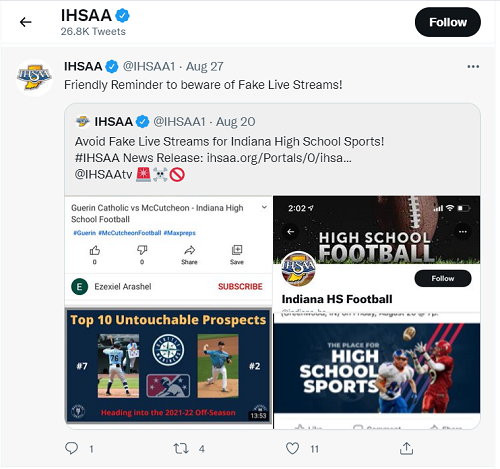

Now taking the field: scammers. High schools and youth sports event owners, who are depending on live streams to have students seen by family members, not to mention college coaches, now have to grapple with fraudulent vendors of streamed games and other activities.
According to the New Mexico Activities Association, such vendors will encourage viewers to create an account (complete with e-mail address and password) in order to view high school sports. Vendors may also appear to offer Facebook events that stream or show content and will also ask for identifying information, including Facebook passwords.
In general, this account is a phishing scam with the goal of harvesting data like usernames, e-mail addresses, passwords – and occasionally credit card information. It also could potentially infect the user’s account with malware.
“They take that information you gave them, they do not deliver any type of stream, and now the people who are behind this scheme have access to any account that you use the same user name and password you just provided,” notes Sports360AZ.
High school athletic associations and event owners nationwide are cautioning parents and other users to be aware of the correct platforms being used – not always an easy task. Scammers have been on the rise and with more games being streamed, it can be difficult, particularly for those who are not IT-savvy, to identify the bad actors.
“Scammers know that people are looking for ways to follow their local high school team without being able to attend,” North Carolina High School Athletic Association Assistant Commissioner for Media Relations James Alverson told reporters at The Graham Star. “This is quick and easy way for someone to take advantage of the high school sports fanbase and our member schools. We want to do everything we can to ensure that fans of our member schools do not fall prey to these scammers.”
Even now, with sports schedules returning to normal, there has been an enormous uptick in live streaming of amateur sports. StreamingMedia.com notes that Grand View Research calculates that the global video streaming market will reach $223.98 billion by 2028 – and that it jumped 30 percent between Q3 2019 and Q3 2020.
Streaming was already in growth mode well prior to 2020, however; as travel teams proliferated, family and friends back home found it easy to stay on top of games. And streaming, even back then, was considered an excellent way for colleges to get advance looks at prospects, without having to travel to do so.
In summer 2020, the National Federation of State High School Associations (NFHS) upped its game, offering each of its member schools two Pixellot cameras (used for live streaming and recording games) at no cost. Member schools needed to pay only installation charges. The NFHS Network is the official video streaming platform of the NFHS. Many of its member schools are using this platform for their own broadcasting needs.
One of the possible complicating factors, however, is that during the regular season, many schools elected to use other entities to do their live streaming. Event owners and local high school athletic departments are being encouraged to educate their users on identifying the correct way to watch teams.
Unfortunately, some scammers use state association logos and other marks to try and deceive users, making it trickier for parents, college coaches and others who legitimately want to use a live stream to get a look at teams who are playing. And often, those individuals are taken in by scammers without even knowing it.
One tactic that could be useful for state associations is to develop an app that includes a link to the streaming service. Additional measures that can help users include embedding that service’s link on the home page for the high school, the high school athletic association and, for private event owners, the tournament website and app.
And how to tell the difference between a bad actor and the reputable streaming provider? Sports360AZ has some recommendations:
“There are dozens of fake “Facebook Events” spreading on the social media platform promising game streams of high school football games. They make an event with a generic football picture and tag school pages, team pages, and district pages providing a strange link for you to click on. If you look at who is hosting the event, it’s a strange name [in other words, not the school or the athletic association, and not even any associated vendor]. These event pages hope that you click the link and takes you to a website that looks like the video is about to begin. It then asks you to “register” to watch the game.”
Caution users not to register for anything but the official service, and remind them that any games will be carried there.
The sad thing, noted the writer, is that there does not seem to be any mechanism for reprisals, even when hucksters are outed: “You can try your best to report them but it most likely won’t achieve much and making your administration aware of a single fake page won’t do much because there are dozens of other phishing pages doing the same thing. The best thing you can do is keep yourself safe and spread the word so everyone is aware of these fraud attempts, and everyone can watch their athletes this season online safely.”

